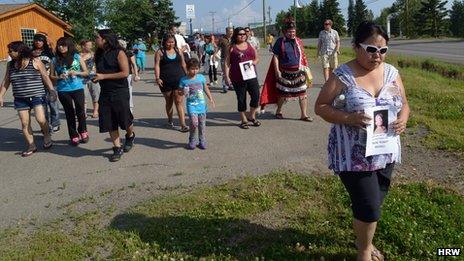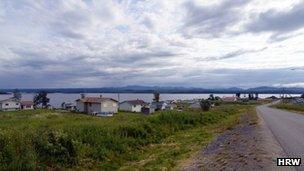RCMP 'discriminates against and abuses' First Nations women
- Published

Community members in Burns Lake, British Columbia, in a spirit-healing walk in remembrance of missing and murdered women
Indigenous women in western Canada are the victims of discrimination and abuse by Royal Canadian Mounted Police (RCMP) officers, says Human Rights Watch.
It interviewed 50 women for the report, entitled Those Who Take Us Away,, external which claims aggressive policing, neglect and allegations of sexual abuse by some RCMP members.
Activists say it has created a climate of fear among First Nation women.
The RCMP said it took the allegations in the report very seriously.
The women interviewed for the report made a series of allegations against the RCMP, including of aggressive policing and inappropriate use of strip searches to accusations of sexual assault.
'Gang raped' by police
One woman told the report's authors that she had been gang raped by police officers.
"There's frustration, there's distrust of authority," said Meghan Rhoad, who wrote the report for Human Rights Watch.
"There's not only a feeling that the police don't take their reports seriously, but that they will themselves be responsible for mistreatment."
Annabel Webb, whose charity, Justice for Girls, contributed to the report, said the police have cultivated a climate of "systematic racism" towards First Nation women and girls, leaving many female victims of crime reluctant to approach the police.
"I won't call the police. I don't trust them," said Angie, a 48-year-old indigenous mother-of-five, who asked the BBC to conceal her real name to protect her family.
In April 2012, Angie's 15-year-old daughter was violently arguing with her boyfriend at the family home, in the fishing town of Prince Rupert on the Pacific coast.
Angie called the police, but she said the argument was largely over by the time two officers arrived.
She took the officers to her daughter and then walked back upstairs to check on her newborn granddaughter.
Angie said she then heard a commotion downstairs.
She said: "The officer comes up the steps and says to me, 'I think I've broken your daughter's arm'."
The officer, who was trying to handcuff her daughter for becoming aggressive, Angie says, twisted the 15-year-old's arm so far up behind her back that her upper forearm broke, vertically, between her shoulder and her elbow.
The police took the teenager away, in handcuffs, to a nearby hospital, according to the report.
The RCMP later claimed that the 15-year-old had threatened to kill herself, which Angie denies. The force says it used proportionate force to stop her.
No-one has been charged with the incident, and Angie's daughter is currently under investigation for allegedly kicking the police officer during the scuffle.
In a statement to the BBC, the RCMP said that after issues were raised by Human Rights Watch last year, the force urged victims of alleged police misconduct to make official complaints.

A survey of children in the Tachie reserve found they did not see police as helpful
"Unfortunately, five months later and none of these allegations have been brought forward for investigation," said the RCMP statement.
"It is impossible to deal with such public and serious complaints when we have no method to determine who the victims or the accused are."
The report's findings are all too familiar, Human Rights Watch says.
"There's a feeling of 'well, this is what happens in these communities'," Ms Rhoad said. "Not necessarily accepting that this is right, but to some extent, that's the way it is. It's very frustrating."
In 2008, the United Nations urged Canada to review its responses to violence and discrimination against First Nation communities, while an earlier report by Amnesty International claimed widespread neglect of native Canadian victims of crime.
British Columbia Justice Minister Shirley Bond said in a statement to the BBC: "We are working hard to make changes to the policies, programmes and services that protect and serve all of us - and particularly vulnerable women."